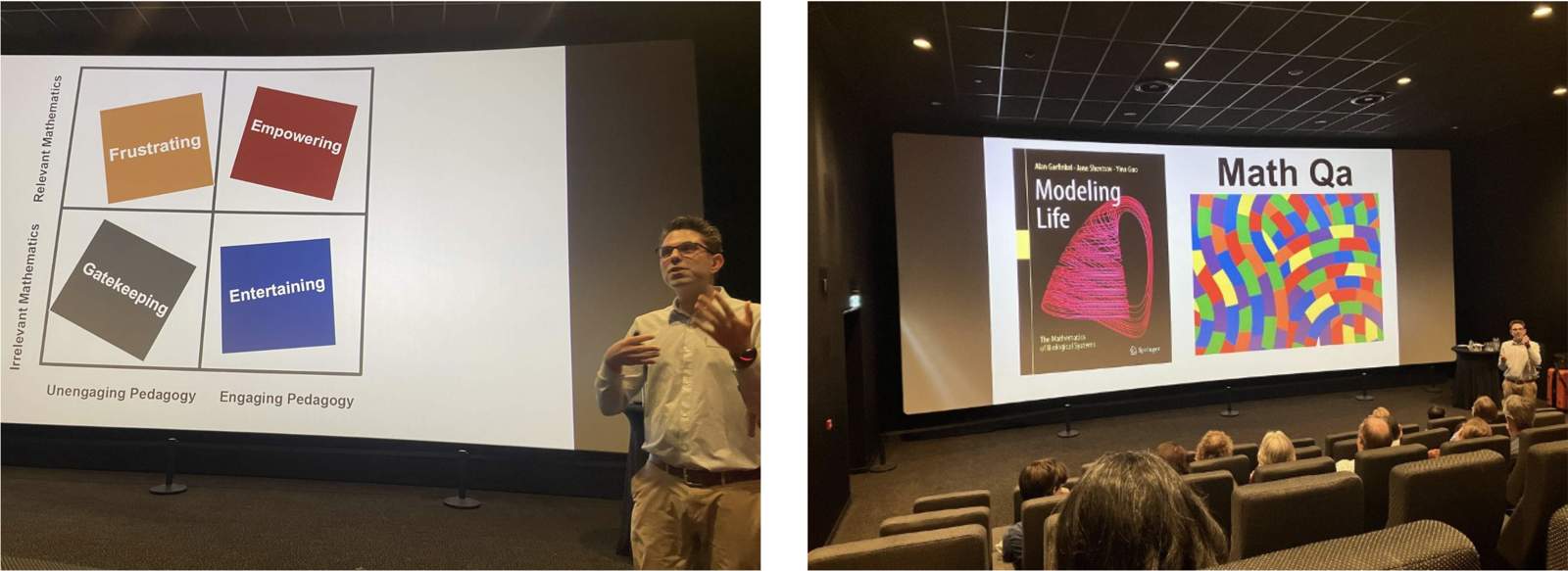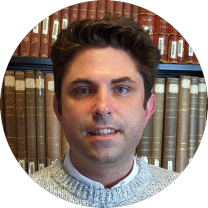In May 2025, dr. Brendan Kelly —who is the Director of Introductory Math at Harvard University— visited the Netherlands upon an invitation of the 4TU.AMI Strategic Research Initiative MEReP. During his two-week stay he gave a keynote lecture at the yearly 4TU.AMI Education Day and visited all five institutes affiliated with 4TU.AMI, where he gave presentations of his work and discussed with teaching staff about educational perspectives and challenges. We grasped the opportunity to interview him during his visit at the Eindhoven University of Technology and hear about his vision on mathematics education.
As the Director of Introductory Math, Kelly leads curriculum design and student support initiatives for the entire university. Introductory mathematics courses have the potential to equip students with the knowledge, skills, and dispositions necessary to solve important problems our world faces. Despite this incredible potential to create transformative educational experiences, students often encounter introductory mathematics courses as a burdensome requirement. Kelly’s vision is to change this attitude, and his key insight is to emphasise real-world applications through mathematical modelling.
Brendan, thank you very much for this opportunity to discuss in more detail about your work and vision.
It has been a great pleasure to be here and participate in the Education Day. My visits at these five universities were very productive and inspiring, it is very interesting to see how Dutch higher education works and to explore possibilities for future collaborations.
To start with, could you tell us more about Introductory Math?
Introductory Math is a broad Harvard program responsible for mathematics education across various undergraduate disciplines—such as economics, physics, chemistry, engineering, and the social sciences. Our team consists of fourteen instructors and an educational research expert. A unique feature of our program is that we're embedded within the Department of Mathematics, allowing us to be closely connected with research groups.
Our main goals are to develop, coordinate, and teach courses that empower students to learn mathematics in ways that are meaningful to their disciplines. We also ensure that all incoming students —who arrive with very diverse academic backgrounds, both nationally and internationally— acquire the necessary mathematical knowledge to succeed in their studies. Finally, we train mathematics teachers and act as a community hub to form a shared vision on mathematics education.
I would like to go some steps back and ask you, how was your career path until now?
I completed my PhD in geometric group theory at the University of Utah. During that time, I became interested in education and volunteered as a middle school teacher. This was an eye-opening experience that exposed me to different school environments and helped me understand how students’ mathematical knowledge can vary widely depending on their educational background. This diversity in background knowledge is also a key challenge at the undergraduate level. This experience made me realize I wanted to use my mathematical expertise to contribute to education. In my final year in Utah, I was a teaching fellow and had the chance to redesign an intermediate algebra course. We based the redesign on the idea that students should take an active role in their learning.
After my PhD, I joined the Harvard Preceptor Program—a postdoctoral track that prepares young mathematicians to become calculus coordinators nationwide. This program has had a major impact on math instruction across the U.S. When a vacancy opened up for my current position, I seized the opportunity and applied.
Can you describe the main challenges you face?
At Introductory Math, we oversee all undergraduate mathematics teaching at Harvard. These programs vary widely, which makes developing courses that serve all students quite challenging. In the U.S., programs typically offer many electives from the first year, and students choose math courses based on their backgrounds and program requirements. Despite the differences among disciplines, we’ve managed to design calculus courses which work for everyone. Our guiding principle is to empower students to learn mathematics in ways relevant to their interests and studies.
In designing our program, we relied on evidence-based practices. For example, a key survey by David Bressoud and Chris Rasmussen on effective strategies for calculus programs highlights the importance of strong course coordination and consistency. We prioritize these in our team. We plan together, reflect regularly on our teaching, and work hard to ensure coherence across classes taught by different teachers.
Which are the basic principles you keep in mind when developing a curriculum?
We design our courses to promote an active learning attitude. As mentioned, our students come from many disciplines, and we aim to make mathematics meaningful to each one. A strong teaching team is essential—one that prioritizes consistency, ongoing improvement, and thoughtful coordination.
From a didactical point of view, we focus on balancing three types of understanding: procedural (applying the chain rule), conceptual (giving a compelling argument why the chain rule holds) and contextual (why is the chain rule important) understanding. Procedural and conceptual understanding strengthen each other. Unfortunately, sometimes in mathematics education we stick to procedural understanding, mostly due to an easier assessment. But this limits students’ potential. We need to design courses that achieve both procedural and conceptual understanding.
Contextual understanding is also important because it teaches students how to transfer their knowledge and apply mathematics in a new situation. Students address the question: why should you care about the chain rule? This is a question all of them have, but finding out a good answer needs work. Providing such contextual understanding leads to higher student engagement.
Could you say something about ongoing projects?
In the U.S., we have strong mathematical societies and plenty of idea exchange—but less sharing of practical teaching materials. This summer, we’re working on a repository of teaching resources that will be AI-curated. Educators can upload their materials, and our tool will extract metadata like keywords, learning objectives, and application areas.
Imagine you're starting a new modeling course. You probably can’t adopt someone else’s course wholesale, but with our system, you could browse a list of learning outcomes and select the ones you want. Then the platform will suggest materials from other institutions that align with those outcomes. We have been working on a pilot and the feedback has been very positive. We want to have a first version online at the end of August.
What would you like to achieve from your visit here?
Having the time and space to experience a different educational context is incredibly inspiring. I've had enriching discussions on topics such as bridging courses and curriculum design. These conversations spark new ideas and show that much is possible when we collaborate and share a vision!
It was a great pleasure and honour to have Brendan Kelly as a visiting guest. As 4TU.AMI we strive to foster strong collaborations to strengthen mathematics research and education! The future seems bright.

